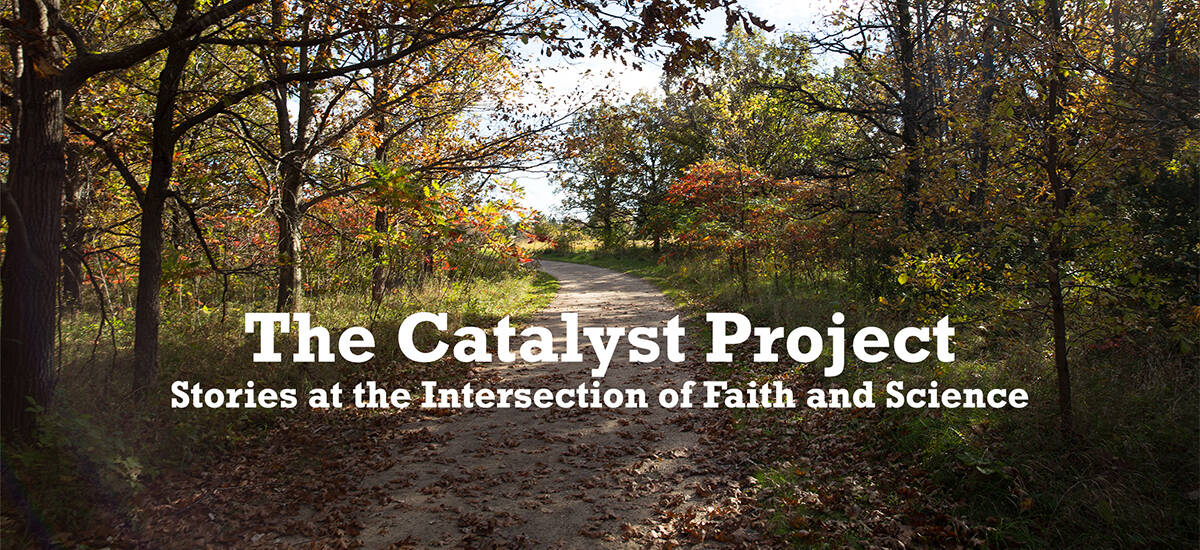
Carly Miller is a first-year biochemistry student at Gustavus. She is involved in many different organizations and activities on campus, including as a coordinator for Big Partner Little Partner. She is also a member of the Evangelical Lutheran Church in America, or ELCA. As Carly pursues her scientific vocation, her faith supports and informs her studies and career goals rather than being fundamentally opposed to them or even detracting from them. Instead, science and religion interact positively in her life and in her goals for the future.
While she is not exactly sure what career she will end up in, Carly is considering working in a healthcare related field, either as some sort of a doctor or as a researcher. She first became interested in science in high school, when she took chemistry. She enjoyed it enough to take AP Chemistry, and her interest in science grew from there. Carly also comes from a family background rooted in science; both of her parents work in the healthcare field. Her strengths and talents are well suited for this kind of work: Carly identifies herself as “a very effective communicator” and an analytical thinker, both personality traits well suited for a vocation in science. She also considers herself to be a very competitive person, though she thinks that this can sometimes be a weakness. In addition to her scientific interest, Carly is studying and passionate about Spanish and music.
There are a variety of values and beliefs that define Carly. She values forming connections with people, saying that close relationships are important to her. Carly also highly values integrity, or “trying to maintain consistency between the type of person I want to be and the type of person that I am”. Additionally, she considers her religious beliefs important to who she is, despite the fact that sometimes it’s challenging to reconcile her faith with scientific knowledge, especially on certain topics or issues.
One issue that Carly has had to work to reconcile her religious beliefs with what science teaches is the issue of creation. She says that she has struggled in some ways to determine what is true when her religion seems to be telling her one thing and her classes and scientific knowledge are telling her another. On the issue of creation, she finds it helpful to think of what her pastor told her when she was in confirmation: “it doesn’t matter how you believe that the world was created, what matters is what kind of force or power is behind that”. In other words, her belief in God isn’t at odds with her confidence in science and scientific knowledge. Carly says that it helps her to keep in mind that she doesn’t have to choose “all science” or “all religion”, but instead can find a balance between the two.
Despite this knowledge, there are some areas that Carly still struggles to figure out how to bring together her faith and what she learns from science. One of these areas is the issue of “proof”, or how you can know something. The analytical thinking that comes so naturally to Carly and is so useful in her scientific work is not always as useful when considering God or aspects of religious beliefs. Additionally, the kind of proof required in science classes or in science-related careers does not or sometimes cannot apply to spiritual or religious questions. Having to rely on faith instead of hard evidence can sometimes be challenging for Carly.
Carly’s faith is informing her vocation in many ways. Part of what draws her to the healthcare field is her interest and passion in science, but another side of it has to do with a spiritual aspect. She says that healthcare is not just “medicine and science”, but it also requires compassion, understanding, and human connection. Carly believes that these interpersonal aspects of healthcare are informed by her faith, and can help her to be a better scientist. Even if she ends up as a medical researcher, she thinks that it’s very important to “keep your faith in the people and your ability to help them in some way in mind”. Thinking about the role that her faith will play in her future career helps Carly in some ways to overcome her need to always be looking for scientific proof when it comes to religious and other more spiritual questions, and instead to rely on her faith. This has helped her become a more faithful person over time.
Carly’s story is an example of personal faith informing a vocation in science. Her strengths and values complement in many ways her potential career paths in healthcare or research, and these strength and values are in many ways rooted in both her faith and her interest in and affinity toward science. Though there are some potential conflicts between science and religion with which she struggles, for the most part, Carly has integrated science and religion in her life in a way that acknowledges and supports both ways of knowing.
